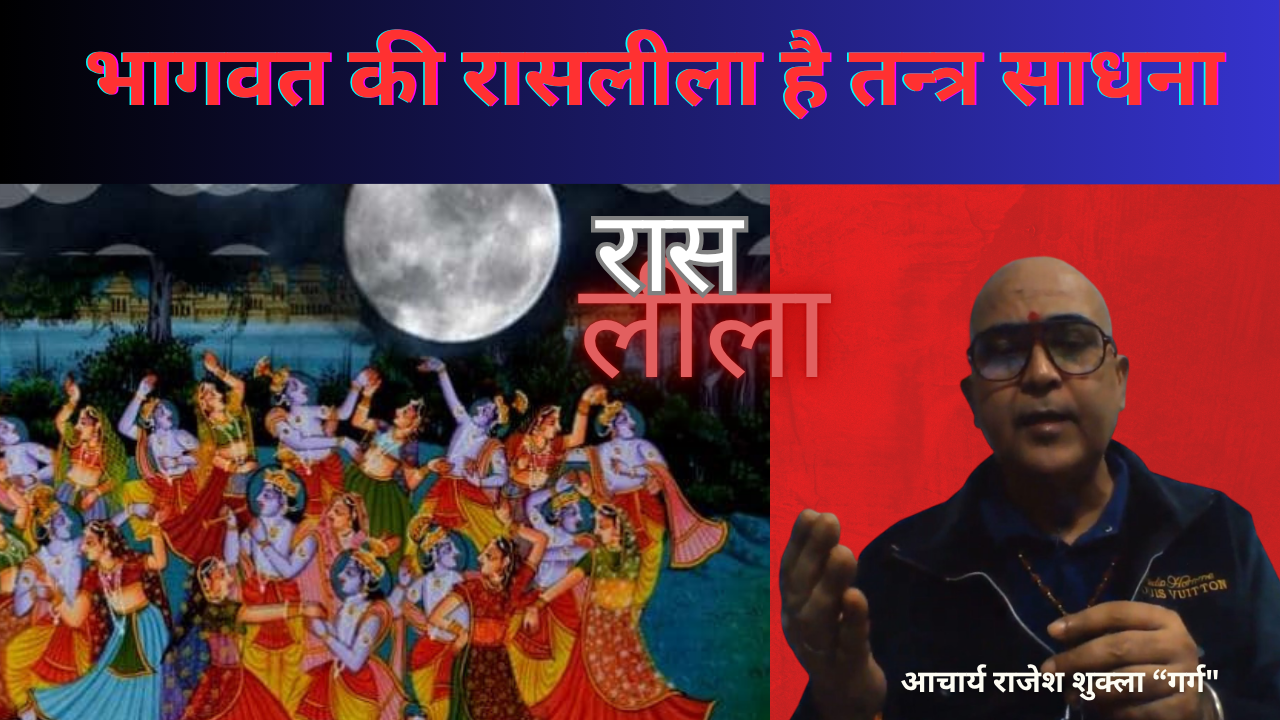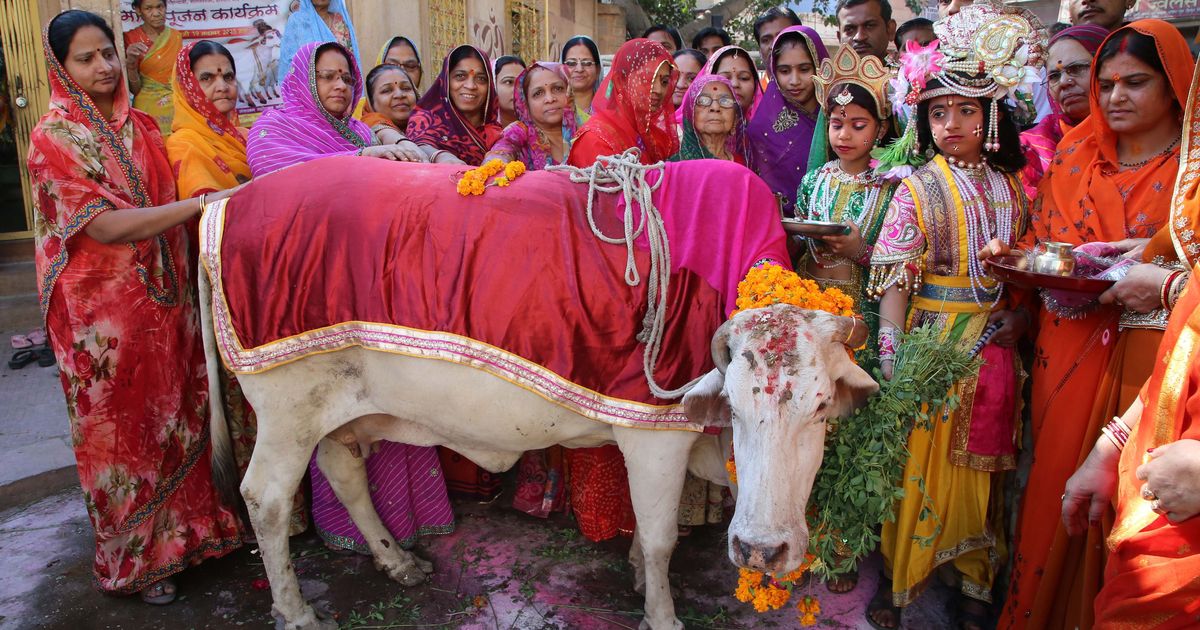
In Hinduism all refrain are essentially of Vaishnava origin and propagated by Vaishnava sages. The first ruler of humans was the King Manu of Ikshvaku clan in solar dynasty of Vivasvān. Vivasvān is Vaishnava so as his son Manu. The first religious moral code of conduct was formulated by him. In Bhagavat Gita the secret knowledge of Karma Yoga was imparted to him and Shri Krishna tells its history too-
इमं विवस्वते योगं प्रोक्तवानहमव्ययम्।
विवस्वान् मनवे प्राह मनुरिक्ष्वाकवेऽब्रवीत्।।4.1।।
The Blessed Lord said I taught this imperishable Yoga to Vivasvan; he told it to Manu; Manu proclaimed it to Ikshvaku.
Ikshvakus were flag bearers of Vedic dharma and all Kings born in the clan strictly followed Manu and Vaishnavism. Among all the five sects of Hinduism Vaishnava, Shaiva, Shakta, Ganpathya and Sauri, the Vaishnavas are the genuine flag bearers of Vedic dharma and culture. The unifier Kings Rama and Krishna were born in Solar and Lunar dynasties respectively, were propagators of Vaishnava dharma. All major religious books of Hindus are originally Vaishnava scriptures and in all of their scriptures three things are prohibited 1-Adultery 2-Meat eating 3-Alcohol or drugs. All refrains essentially are of Vaishnava origin and emanate from the Vedic law of Rita(ऋत). The Vedic law of Rita(ऋत) is founded on Nonviolence and Truth. The spirituality taught in Vedic scriptures are established on it. Hence the Law of Manu is said to be the medicine regarding all social evils. In this article I am focusing only on meat eating in larger Hinduism. In Manu Smriti you find these verses on prohibition of meat eating; Manu describes the word mamsa मांस [Mam( my)+Sah(he)] which means that If I will eat meat of any animal, after my death he will also eat my meat-
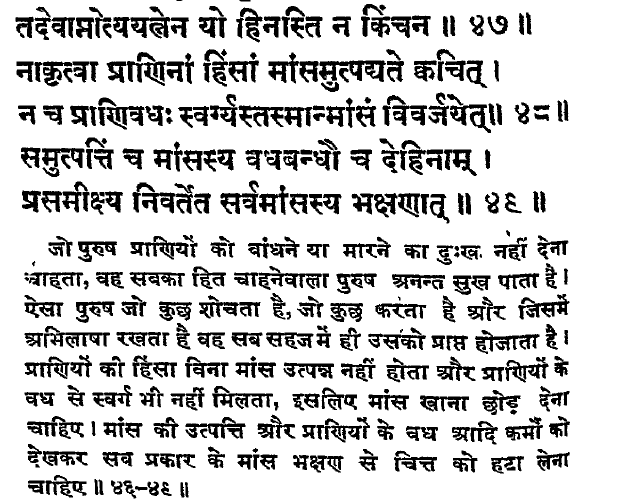
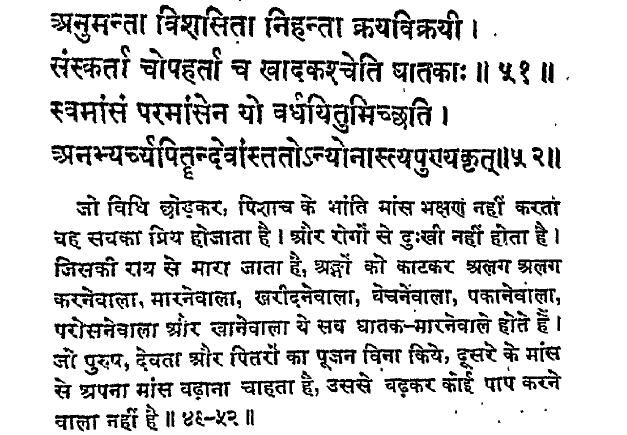
No spiritual man can reject these verses of Manu. There is no bigotry in it, it is based on the logic of core scriptures of Hindus. In Manu’s constitution it is not a crime, it is Sin. He writes clearly ” ‘na mamsa bhakshen dosho’ there is no crime in eating meat as it is tendency of people but it would be of great benefit for them if they renounce it ‘nvrittistu mahaphala’ “. Meat and alcohol is not propagated even in late Vaishnava Puranas and smritis. But the scriptures coming from Shaiva tradition openly propagated it. In the scriptures of Shaiva sect and Puranas we find the mention of use of meat and alcohol, even In rituals done for Pitris and their Gods are openly propagating it.
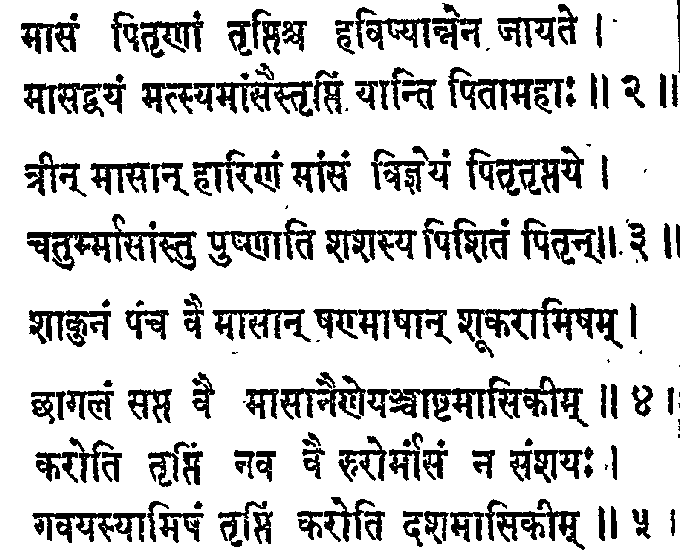
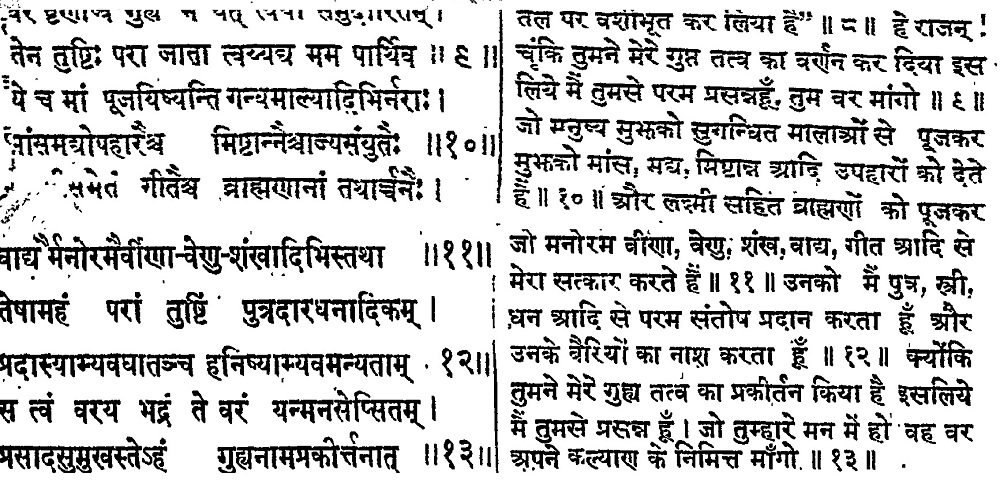
In Shakta scripture and Puranas too we find ample references of use of alcohol and meat. One of the core Shakta scripture ‘Durga Shaptashati’ which is part of Markandeya Puran has obtained separate Identity, it also describes the use of blood and flesh “ददतुस्तौ बलिं चैव निजगात्रासृगुरक्षितम्” which indicates Tantrik nature of worship. But in northern India ‘Durga Shaptashati’ becomes a Vaishnava scripture and strictly following Vedic Bhagavat dharma Hindu families observe Navaratri with great devotion. Markandeya was a Shaiva Tantrik hence in his texts it is very much normal. Bhavishya Puran which was written in late 9th-10th century or may be in 11th century in Tantrik dark ages finds mention of sacrifices and use of meat and alcohol in worship.
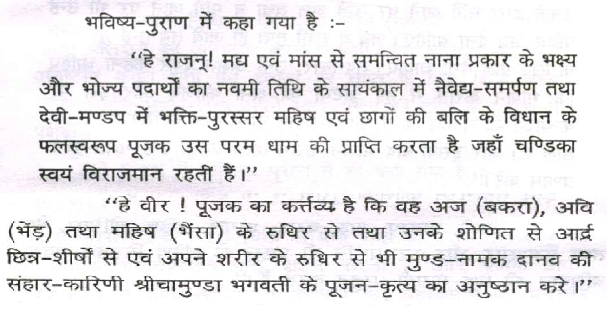
Kalika Purana of Shakta sect transcends all boundaries and propagates nine kind of Sacrifices in which the sacrifice of humans is said be the most pleasing to goddess Kalika and blood dripping from head is called nectar which fully satisfies her. However on other side, Vaishnava Devi Puran says that such kind of Tantrik worship is opposed to Vedic scriptures are of Tamasik lowly nature and was taught by Shiva to delude the sinners. The practicener of the dirty Tantrik Sadhana are the cursed and fallen human beings.
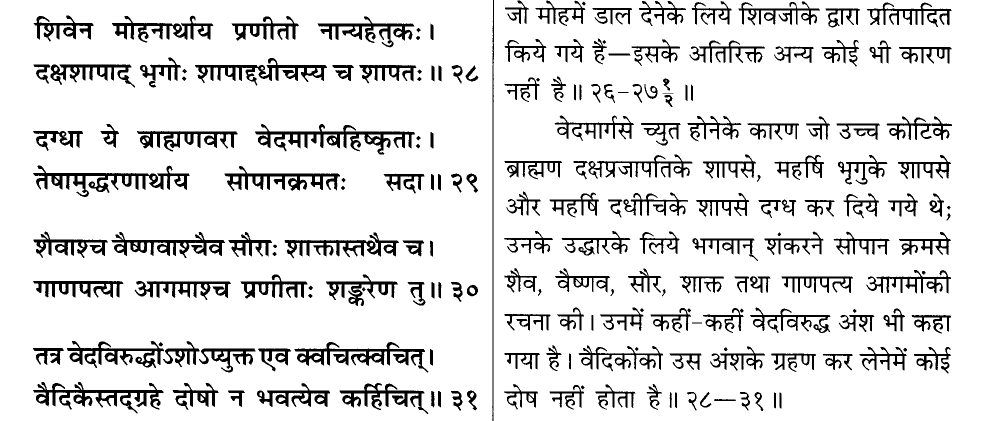
Devi Bhagavat Puran is Vaishnava Puran which propagates Devi worship according to Bhagavat dharma. All the five Hindu sects are Shakta at the very core but show themselves Veidik outwardly. Because of its Sattvika nature and refined religious code of conduct, Vedic Bhagavat dharma is revered and practiced in Hindu families while dirty looking Tantrik Shaivas remain at the periphery doing what they have been for centuries.
The Yoga tradition also completely boycotts meat eating because Sage Patanjali begins with Yama and Niyam which are premises for Yoga.
अहिंसासत्यास्तेयब्रह्मचर्यापरिग्रहा यमाः॥२.३०॥
Non violence, Truthfulness, Non-stealing, Brahmacharya, Non-possessiveness or absence of greed are called abstinence. Patanjali says that these great Vows are not limited by class, place, time and circumstance.
शौचसंतोषतपःस्वाध्यायेश्वरप्रणिधानानि नियमाः॥२.३२॥
Internal and external purification, contentment, austerity, self-study and devotion to God – are the Niyamas. These both sutras are premise of Yoga. Without it there can be no spiritual development at all. In these two sutras Nonviolence and Shauch that is Internal and external purification are related to Vegetarian food. Internal and external purification is not possible without it. If you eat meat body will be impure, it will stink like the animal you have eaten.
The cultivation of non-violence on all the three plane i.e. physical, mental and in speech; makes one fearless and divine. Sage Patanjali says that in front of such a sage all beings and dangerous animals abandon their hostile nature. अहिंसाप्रतिष्ठायां तत्सन्निधौ वैरत्यागः॥२.३५॥ Because of cultivation of non-violence, sages lived and meditated fearlessly in deep forests.
These prohibition have spiritual basis and firmly established on the teachings of Upanishadic sages. Chandogya Upanishad says “अन्नमयं हि सोम्य मनः” Your mind is made of food because food is Pran. Hence is said “आहारशुद्धौ सत्त्वशुद्धिः सत्त्वशुद्धौ ध्रुवा स्मृतिः। स्मृतिलम्भे सर्वग्रन्थीनां विप्रमोक्षः When the food is pure, the mind becomes pure; when the mind is pure, remembrance becomes firmly fixed; and when Smriti is acquired, there is release from all knots of the heart.” The memory needed for the realization of truth is obtained only when food it pure. But Vaishnava dharma does not stop here, it goes further and says that food becomes absolutely pure when it is obtained from Yajna. You obtain food form the nature, do you return it? If you do not return it then you are a sinner, your food is not pure. Everything should be done for the sake of sacrifice. Bhagavad Gita says-
यज्ञशिष्टाशिनः सन्तो मुच्यन्ते सर्वकिल्बिषैः।
भुञ्जते ते त्वघं पापा ये पचन्त्यात्मकारणात्।।3.13।।
The righteous who eat the remnants of the sacrifice are freed from all sins; but those sinful ones who cook food (only) for their own sake verily eat sin.
Therefore the prohibition of meat eating is ultimately founded of the divine laws of Rita ऋत which was propagated by God in the very beginning of creation. It is explained in Bhagavad Gita-
कर्म ब्रह्मोद्भवं विद्धि ब्रह्माक्षरसमुद्भवम्।
तस्मात्सर्वगतं ब्रह्म नित्यं यज्ञे प्रतिष्ठितम्।।3.15।।
From food come forth beings; from rain food is produced; from sacrifice arises rain and sacrifice is born of action. Action comes from Brahma (Vedas) and Vedas comes from the Imperishable. Therefore, the all-pervading (Brahma the supreme lord) ever rests in sacrifice.




